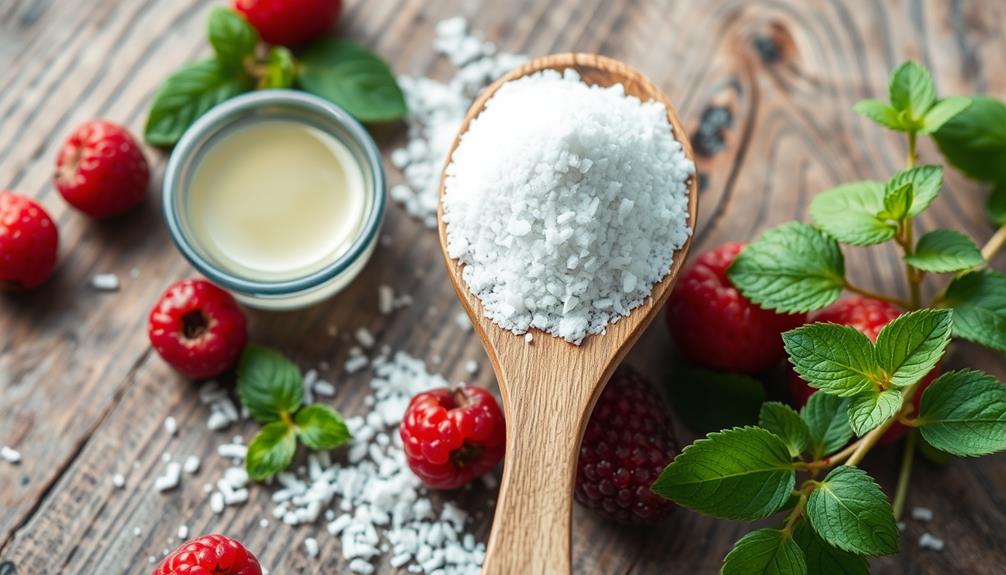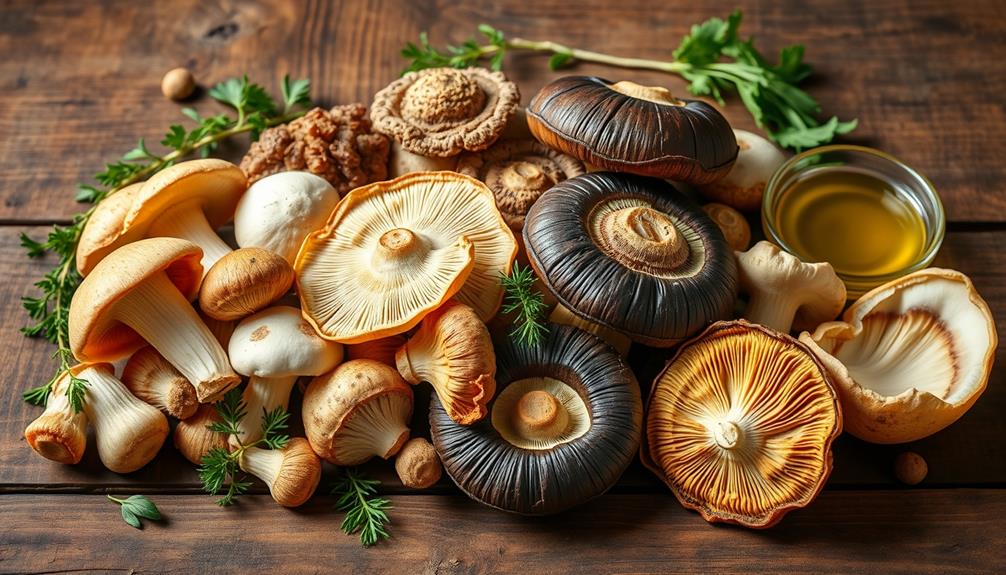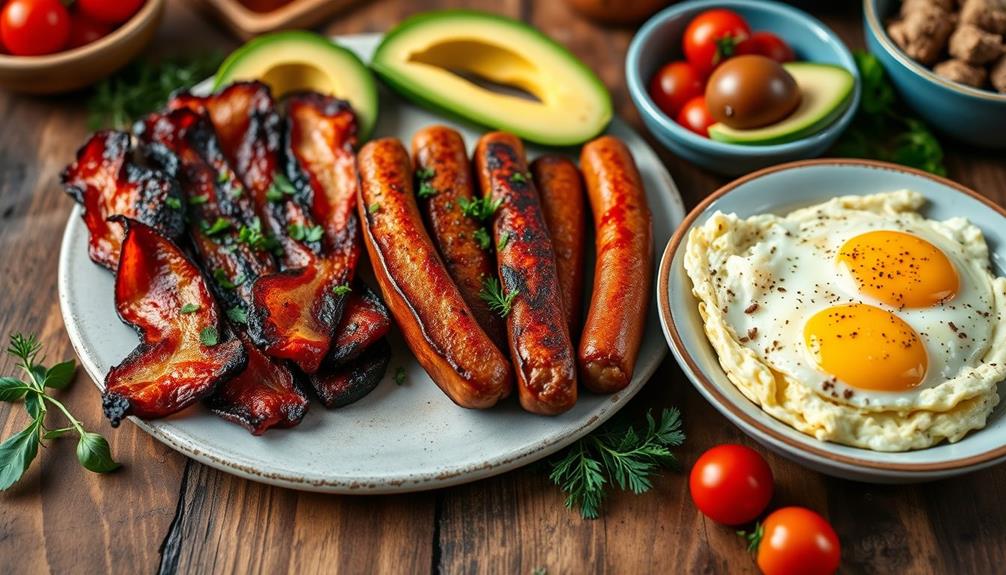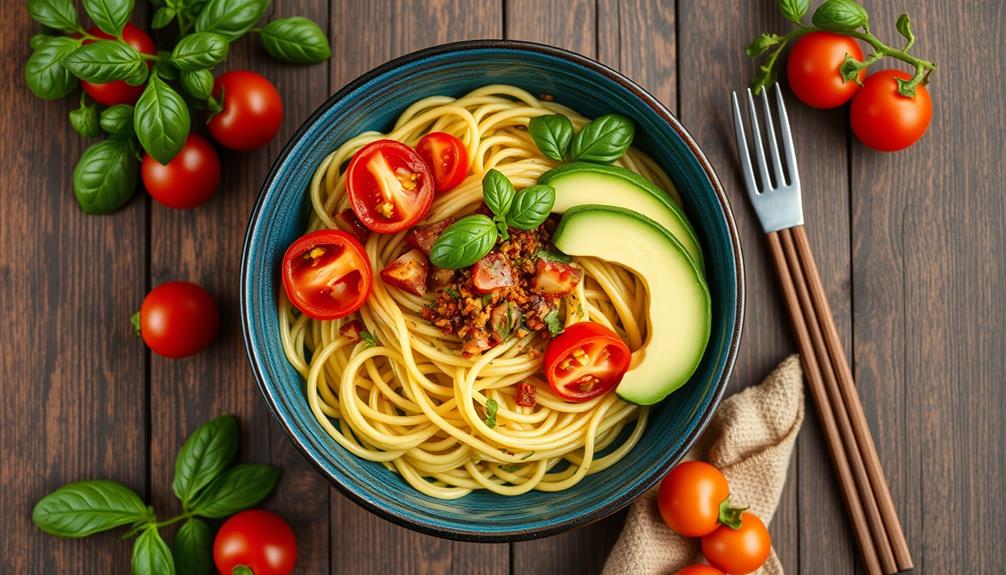When it comes to the best sweeteners for your keto diet, erythritol, stevia, and monk fruit are top choices. Erythritol is nearly calorie-free and has zero carbs, making it great for baking. Stevia is incredibly sweet, so you'll only need a tiny amount, while monk fruit also packs in sweetness without any calories or carbs. Avoid traditional sweeteners like honey or coconut sugar, as they can disrupt your ketosis. Choosing the right sweetener can help keep your carb intake low and maintain your dietary goals. If you're curious about substitution ratios and recipes, more tips await you.
Key Takeaways
- Stevia, erythritol, and monk fruit are excellent low-carb sweeteners suitable for maintaining ketosis without raising blood sugar levels.
- Erythritol has minimal calories and a glycemic index of zero, making it ideal for baking.
- Monk fruit sweetener provides zero calories and carbs, with antioxidant benefits and unique flavor.
- Xylitol offers a 1:1 sweetness ratio compared to sugar but may cause digestive discomfort in large amounts.
- Avoid high-carb sweeteners like honey, coconut sugar, and maple syrup to maintain ketosis effectively.
Overview of Keto Sweeteners
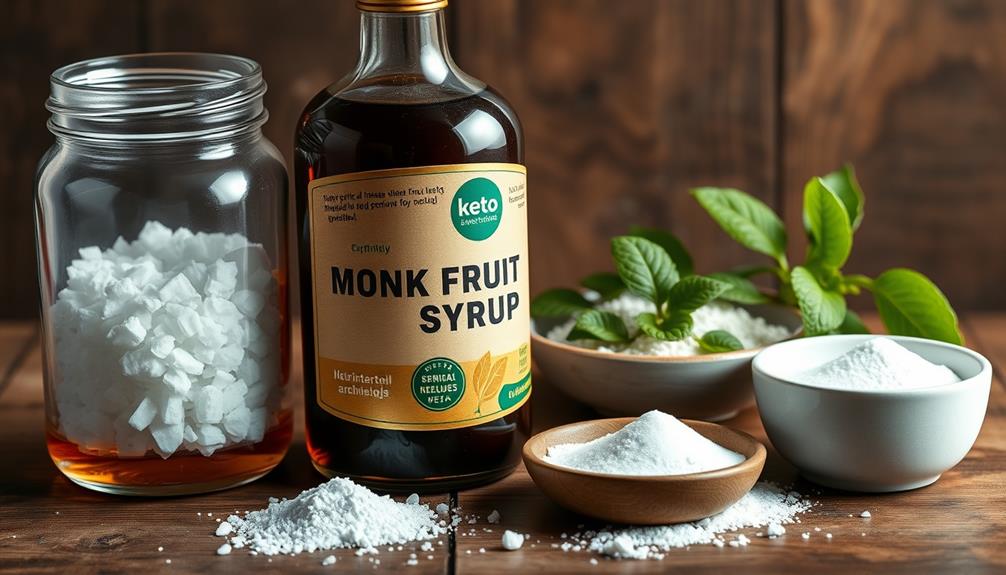
Keto sweeteners are your go-to allies when you want to satisfy your sweet tooth without derailing your diet. These low-carb sugar alternatives help you indulge in sweetness while keeping your blood sugar stable.
Among the most popular keto sweeteners are stevia, erythritol, and monk fruit, each offering unique benefits. Stevia is impressively 200-400 times sweeter than sugar, meaning you need only a tiny amount to achieve your desired sweetness.
Erythritol, a sugar alcohol, provides just 0.24 calories per gram and has a glycemic index of zero, making it an excellent choice for those on a low-carb diet. Additionally, many keto sweeteners are rich in antioxidants, which can contribute to overall health and wellness, similar to the benefits of cranberry juice consumption.
Monk fruit is another fantastic option, with no calories and a zero glycemic index, helping maintain ketosis while satisfying cravings. Most of these keto sweeteners minimize the impact on blood sugar, allowing you to enjoy your favorite treats without the guilt.
However, it's essential to be mindful of overall carb intake and check for hidden sugars in processed products, as some sweeteners may include additives that could disrupt ketosis.
Best Sweeteners for Keto
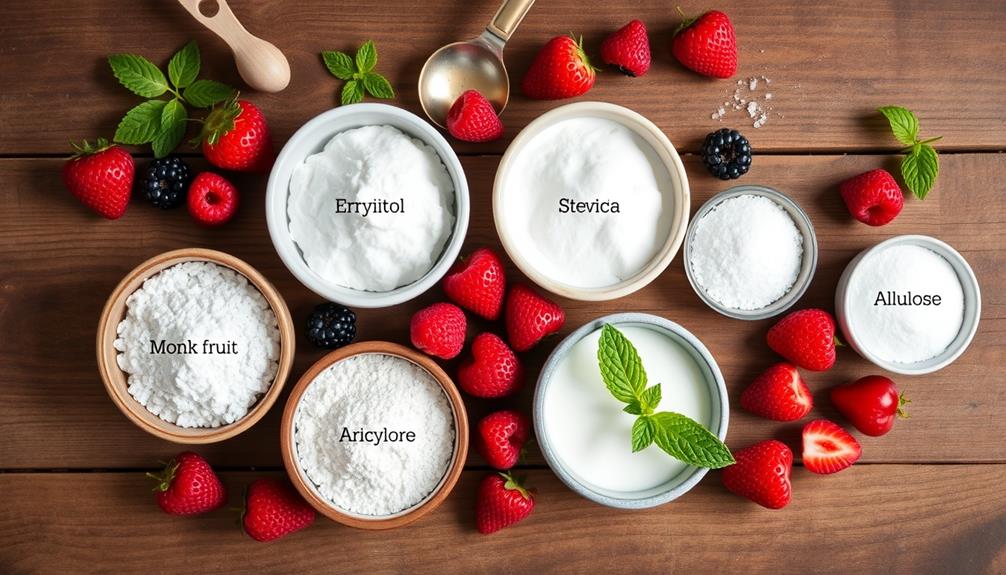
When you're on a keto diet, choosing the right sweeteners can make all the difference.
Stevia, erythritol, and monk fruit are among the top options, each with unique sweetness levels and health benefits.
Mindfulness practices can help you navigate cravings and make healthier choices.
Understanding substitution ratios will help you use these sweeteners effectively in your favorite recipes.
Top Keto Sweeteners
Exploring the best sweeteners for your keto diet can enhance your culinary experience while keeping your carb intake low. When it comes to sweetening your keto-friendly treats, options like stevia, erythritol, and monk fruit extract are great choices to add sweetness without spiking your blood sugar. In addition to these sweeteners, incorporating the best ketofriendly dark chocolates into your desserts can satisfy your sweet tooth without derailing your keto goals. These chocolates are often sweetened with low-carb sweeteners and have a high cocoa content, making them a perfect indulgence for those following a keto diet.
Stevia, derived from the Stevia rebaudiana plant, is a standout choice; it's 200-400 times sweeter than sugar, has zero calories, and barely affects blood sugar levels.
Additionally, incorporating natural remedies like essential oils can complement your health journey, such as using essential oils for respiratory health to support overall well-being.
Erythritol, a sugar alcohol, offers about 70% of sugar's sweetness with virtually no calories, making it ideal for baking and cooking while keeping your diet low carb.
Monk Fruit Sweetener is another excellent option, boasting a sweetness level of 100-250 times that of sugar, along with zero calories and carbs, plus antioxidant benefits.
If you're considering Xylitol, remember it has a sweetness comparable to sugar but contains 40% fewer calories. Just be cautious, as it may cause digestive issues, so enjoy sweeteners in moderation.
Finally, Allulose provides about 70% of sugar's sweetness with minimal calories and doesn't raise blood sugar, making it a great fit for your ketogenic lifestyle.
Sweetener Substitution Ratios
Finding the right sweetener substitution ratios can transform your keto cooking and baking experience. Understanding how to swap sugar for keto-friendly sweeteners will help you maintain your ketogenic diet while enjoying delightful flavors.
Additionally, being aware of potential side effects and interactions of some sweeteners can enhance your overall dietary choices, especially when considering common types of cold medications for any seasonal ailments.
Here are some key ratios to keep in mind:
- Stevia: Use 1 tsp (4 g) for every 1 cup (200 g) of sugar. It's a potent low-calorie option!
- Erythritol: You'll need 1 1/3 cups (267 g) to match the sweetness of 1 cup (200 g) of sugar since it's about 80% as sweet.
- Monk Fruit Sweetener: This one varies by brand, being 100-250 times sweeter than sugar, so always check specific product labels for accurate ratios.
While other sweeteners like xylitol and sucralose can have different substitution ratios, sticking to these will keep your recipes on track.
Sweeteners to Avoid

In your quest for the best sweeteners on a keto diet, it's crucial to steer clear of certain options that can sabotage your efforts. Many sweeteners, while seemingly healthier, are high in carbs and can disrupt ketosis.
For instance, honey, despite its antioxidants, is packed with calories and carbohydrates that can kick you out of ketosis. Similarly, coconut sugar may be absorbed slowly, but it's still high in fructose, making it unsuitable for keto.
Understanding common financial terms can help in making informed decisions about your health and wellness investments.
You should also avoid maple syrup, which, although rich in micronutrients, is loaded with sugar and carbs. Agave nectar is another sweetener to avoid; it's composed of around 80% fructose and can worsen insulin sensitivity.
Finally, maltodextrin, derived from starchy plants, has a glycemic index similar to refined sugar and isn't a viable option for keto.
To succeed on your keto journey, stick to low-carb sweeteners. By avoiding these high-carb sweeteners like honey, coconut sugar, maple syrup, agave nectar, and maltodextrin, you'll have a better chance of maintaining ketosis and achieving your health goals.
Health Considerations

When choosing sweeteners for your keto diet, it's important to reflect on their health implications. The right keto sweeteners can help you maintain balanced blood sugar levels while providing health benefits.
Here are three top options to evaluate:
- Stevia: Derived from the Stevia rebaudiana plant, it's 200-400 times sweeter than sugar and may help regulate blood sugar levels.
- Erythritol: This sugar alcohol is absorbed quickly into the bloodstream and offers a nearly calorie-free option with minimal digestive discomfort for most.
- Monk Fruit Extract: Containing mogrosides, monk fruit sweetener may act as an antioxidant, improving insulin sensitivity without adding calories or carbs.
While these sweeteners can support weight management by reducing sugar intake, be mindful of sugar cravings that may arise from their sweet taste.
Moderation is key to avoiding unnecessary temptation. By understanding the health implications of these keto sweeteners, you can make informed choices that align with your dietary goals and promote overall well-being.
Sweetener Substitution Tips

Sweeteners can enhance your keto recipes while keeping your carb intake low, but knowing how to substitute them effectively is key.
For stevia, you'll need just 1 teaspoon to replace 1 cup of sugar, as it's 200-400 times sweeter and contains zero calories or carbs. If you prefer erythritol, use 1 1/3 cups for each cup of sugar; this sweetener has about 70% of sugar's sweetness and won't greatly impact blood sugar levels.
When considering xylitol, you can substitute it in a 1:1 ratio, but be cautious, as large amounts might cause digestive issues.
Monk fruit sweetener varies by brand; it can be 100-250 times sweeter than sugar, so always check the guidelines for substitution amounts.
For sucralose, it works well in a 1:1 ratio for most recipes. However, be aware that it may not be suitable for high-temperature baking due to potential chemical changes.
With these substitution tips, you can enjoy your favorite recipes without worrying about calories and carbs while keeping your keto diet on track.
Related Resources and Articles
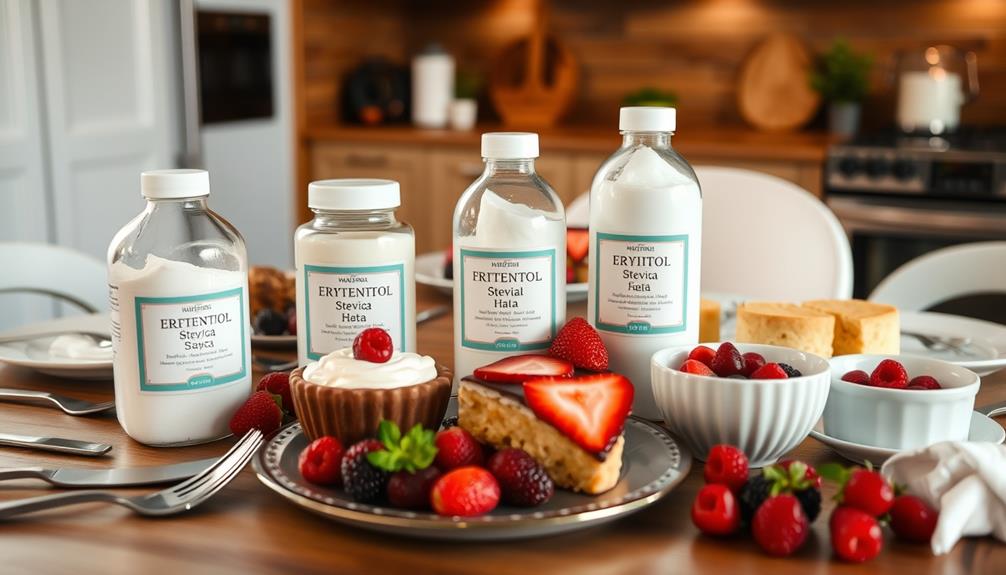
Whether you're new to the keto diet or looking to refine your approach, exploring related resources can deepen your understanding of the best sweeteners available.
By familiarizing yourself with sweeteners like stevia, erythritol, and monk fruit, you can enhance your culinary experiences without compromising your health.
Here are three valuable resources to evaluate:
- Keto Baking Guides: Discover how to use erythritol and monk fruit in your favorite recipes, ensuring your treats are both delicious and keto-friendly.
- Nutritional Studies: Explore the effects of stevia and erythritol on blood sugar and insulin levels, reinforcing their status as low-calorie, natural sweeteners.
- Antioxidant Benefits of Monk Fruit: Learn about the unique properties of monk fruit and its mogrosides, which may offer antioxidant benefits while keeping your carb intake low.
Frequently Asked Questions
What Sweetener Is Ok on Keto?
When you're looking for a sweetener on keto, try stevia, erythritol, or monk fruit. They're low in carbs and won't spike your blood sugar, helping you stay in ketosis without sacrificing sweetness.
Is Stevia or Splenda Better for Keto?
When choosing between stevia and Splenda, think of it like picking a paint for your masterpiece. Stevia's natural, vibrant hues can enhance your dish, while Splenda offers a smoother finish but might introduce unwanted elements.
Is Erythritol or Stevia Better for Keto?
When choosing between erythritol and stevia, consider your preferences. Erythritol offers a sugar-like texture, while stevia's intense sweetness might suit your needs. Both are low-calorie, but you might experience digestive issues with erythritol.
What Is the Best Keto Sugar Substitute Without Aftertaste?
When choosing a sugar substitute without aftertaste, consider monk fruit or allulose. Both offer natural sweetness without calories or carbs, ensuring your dishes taste great while keeping your diet on track. You won't be disappointed!
Conclusion
In the garden of your keto journey, choosing the right sweetener is like tending to the finest blooms. You want the sweetest fruits without the weeds of sugar that can choke your progress. By picking from the best options and avoiding the harmful ones, you'll cultivate a thriving landscape of flavor and health. So, dance through your culinary creations with confidence, knowing you've sown the seeds of success. Your taste buds will thank you as they flourish!
